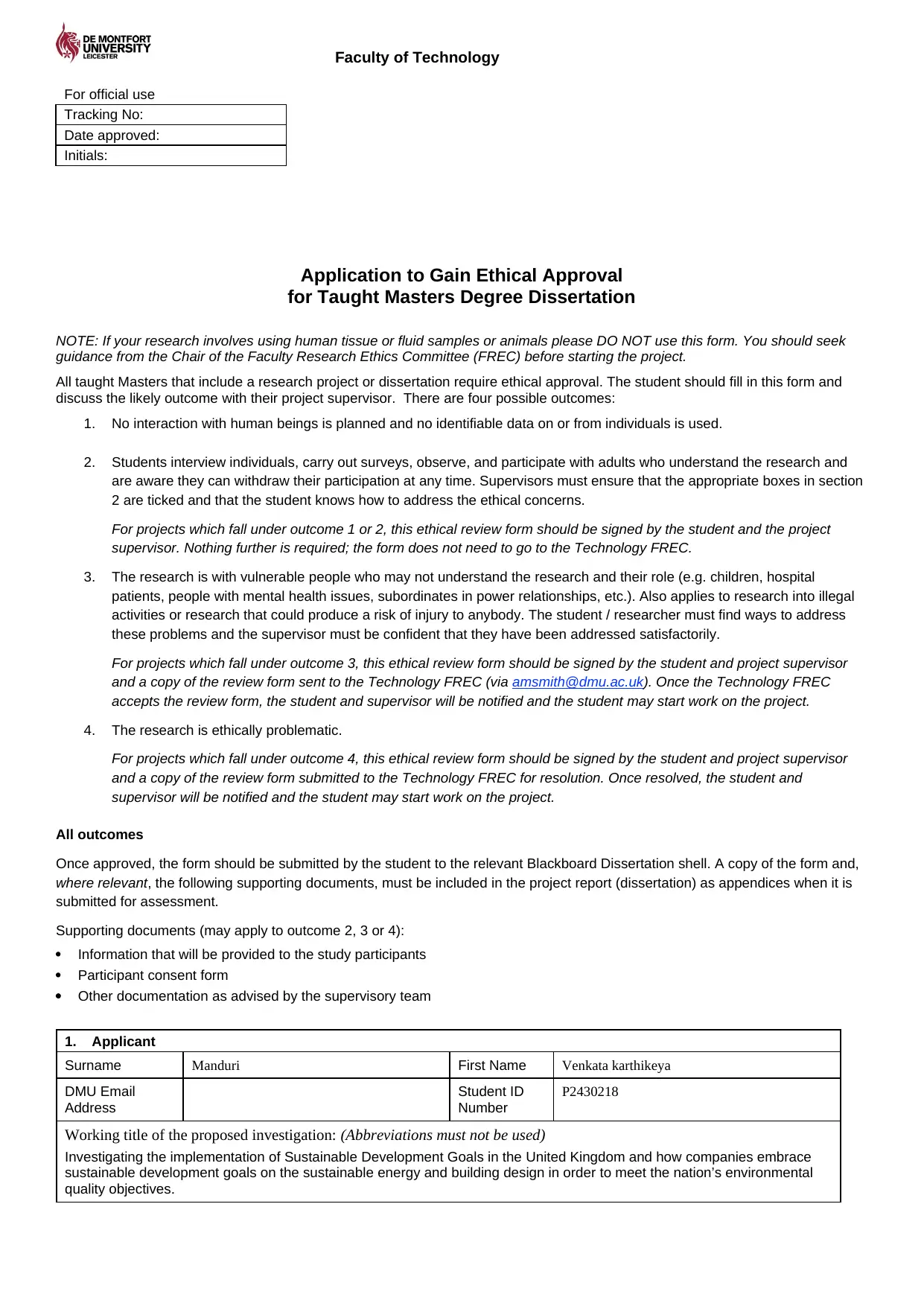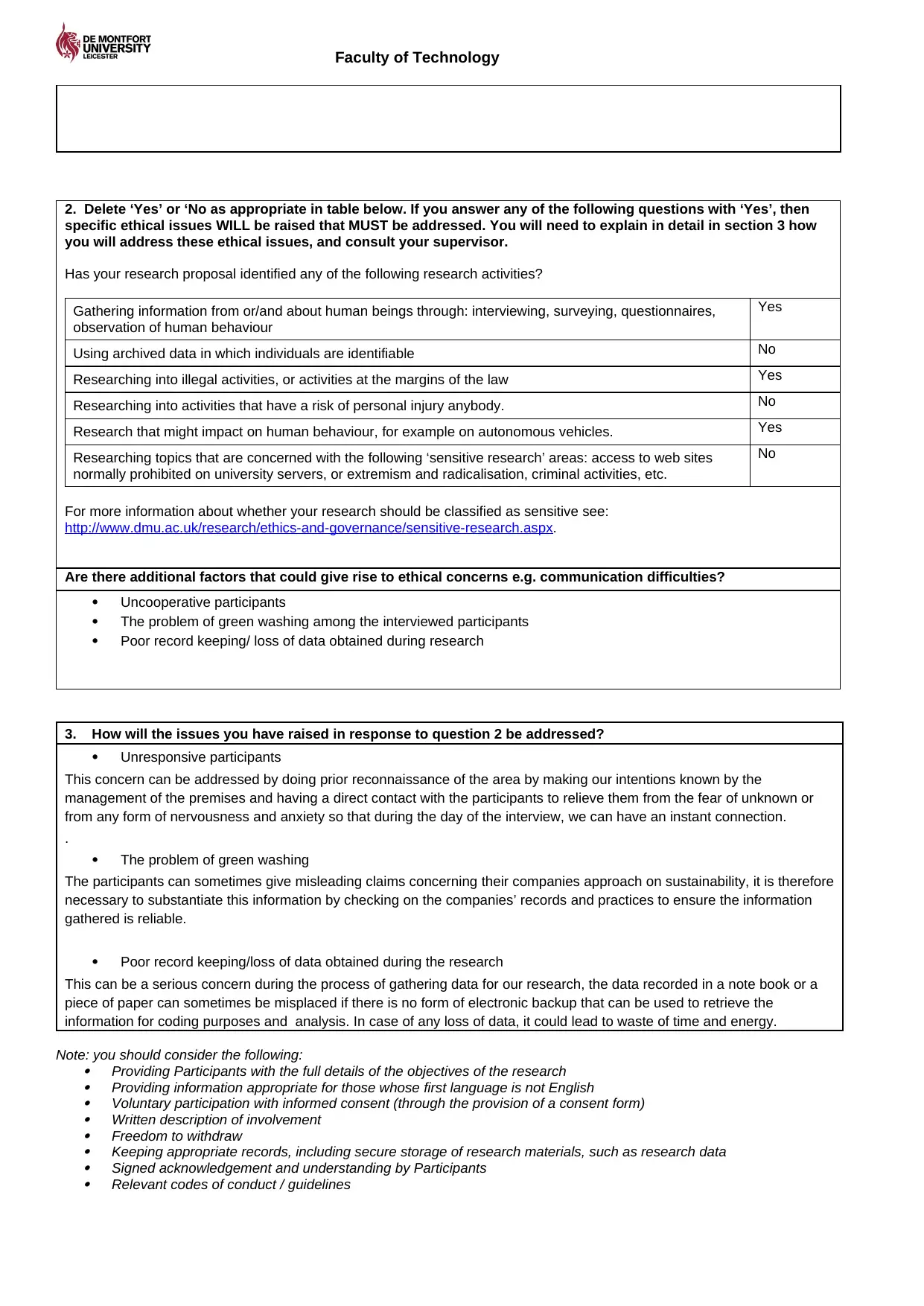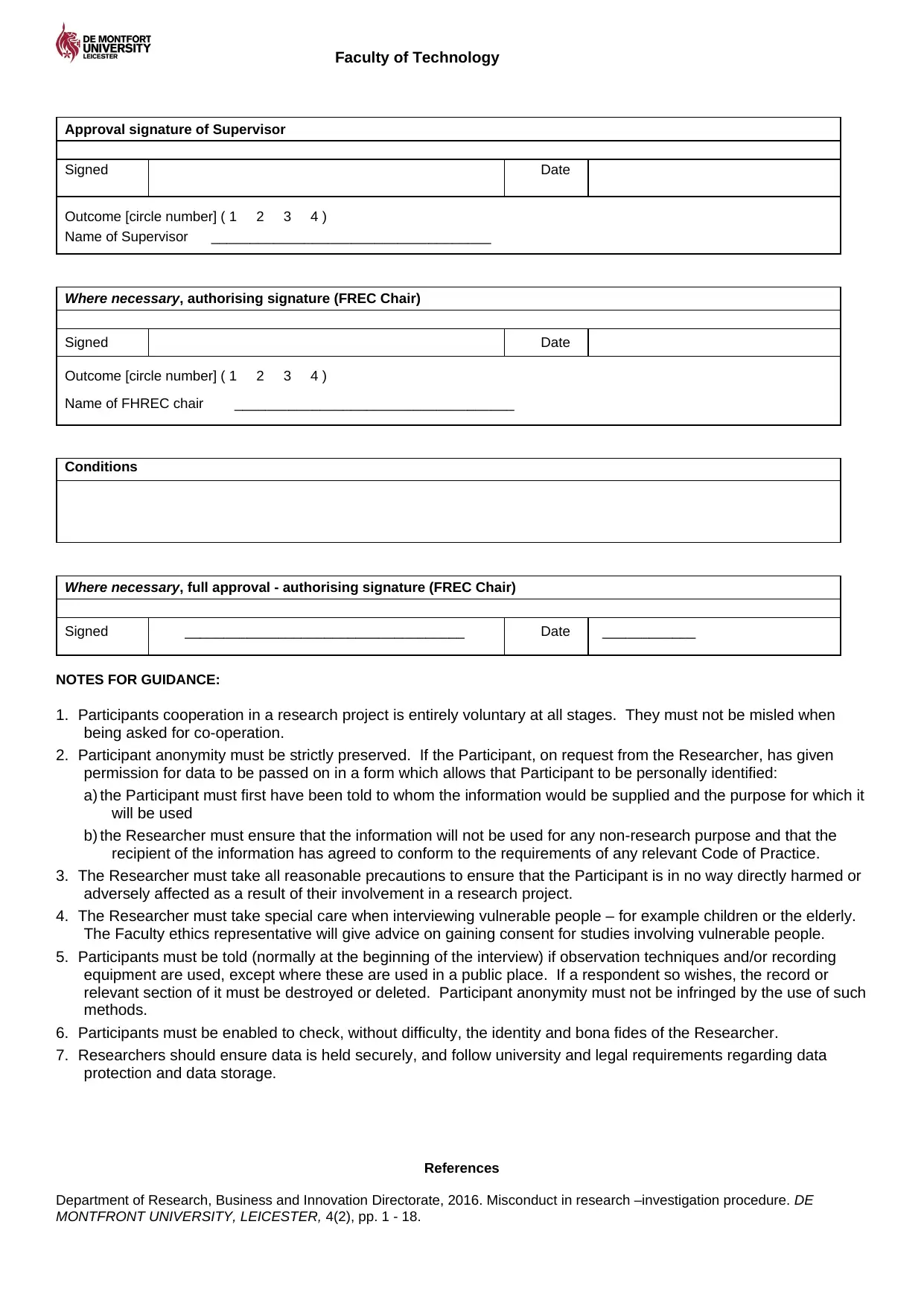Faculty of Technology: Ethical Approval Application for Dissertation
VerifiedAdded on 2022/11/14
|6
|1686
|306
Homework Assignment
AI Summary
This document is an ethical approval application submitted by a student at De Montfort University for their Masters dissertation. The research focuses on investigating the implementation of Sustainable Development Goals (SDGs) in the United Kingdom, specifically examining how companies integrate these goals within sustainable energy and building design to meet environmental quality objectives. The application addresses potential ethical concerns related to gathering information from human beings through interviews, the risk of 'greenwashing' among participants, and the importance of data security. The student outlines strategies to address these issues, including participant consent, data verification, and secure data storage. The application references ethical codes of conduct, emphasizing openness, honesty, and adherence to relevant laws and statutes. The form includes sections for the applicant's details, a checklist of potential ethical issues, a detailed plan to address those issues, and references to ethical codes, with space for signatures from the student, supervisor, and, where necessary, the Faculty of Technology Research Ethics Committee (FREC) chair. The document also includes notes for guidance, emphasizing voluntary participation, participant anonymity, and the responsible handling of research data.

Faculty of Technology
For official use
Tracking No:
Date approved:
Initials:
Application to Gain Ethical Approval
for Taught Masters Degree Dissertation
NOTE: If your research involves using human tissue or fluid samples or animals please DO NOT use this form. You should seek
guidance from the Chair of the Faculty Research Ethics Committee (FREC) before starting the project.
All taught Masters that include a research project or dissertation require ethical approval. The student should fill in this form and
discuss the likely outcome with their project supervisor. There are four possible outcomes:
1. No interaction with human beings is planned and no identifiable data on or from individuals is used.
2. Students interview individuals, carry out surveys, observe, and participate with adults who understand the research and
are aware they can withdraw their participation at any time. Supervisors must ensure that the appropriate boxes in section
2 are ticked and that the student knows how to address the ethical concerns.
For projects which fall under outcome 1 or 2, this ethical review form should be signed by the student and the project
supervisor. Nothing further is required; the form does not need to go to the Technology FREC.
3. The research is with vulnerable people who may not understand the research and their role (e.g. children, hospital
patients, people with mental health issues, subordinates in power relationships, etc.). Also applies to research into illegal
activities or research that could produce a risk of injury to anybody. The student / researcher must find ways to address
these problems and the supervisor must be confident that they have been addressed satisfactorily.
For projects which fall under outcome 3, this ethical review form should be signed by the student and project supervisor
and a copy of the review form sent to the Technology FREC (via amsmith@dmu.ac.uk). Once the Technology FREC
accepts the review form, the student and supervisor will be notified and the student may start work on the project.
4. The research is ethically problematic.
For projects which fall under outcome 4, this ethical review form should be signed by the student and project supervisor
and a copy of the review form submitted to the Technology FREC for resolution. Once resolved, the student and
supervisor will be notified and the student may start work on the project.
All outcomes
Once approved, the form should be submitted by the student to the relevant Blackboard Dissertation shell. A copy of the form and,
where relevant, the following supporting documents, must be included in the project report (dissertation) as appendices when it is
submitted for assessment.
Supporting documents (may apply to outcome 2, 3 or 4):
Information that will be provided to the study participants
Participant consent form
Other documentation as advised by the supervisory team
1. Applicant
Surname Manduri First Name Venkata karthikeya
DMU Email
Address
Student ID
Number
P2430218
Working title of the proposed investigation: (Abbreviations must not be used)
Investigating the implementation of Sustainable Development Goals in the United Kingdom and how companies embrace
sustainable development goals on the sustainable energy and building design in order to meet the nation’s environmental
quality objectives.
For official use
Tracking No:
Date approved:
Initials:
Application to Gain Ethical Approval
for Taught Masters Degree Dissertation
NOTE: If your research involves using human tissue or fluid samples or animals please DO NOT use this form. You should seek
guidance from the Chair of the Faculty Research Ethics Committee (FREC) before starting the project.
All taught Masters that include a research project or dissertation require ethical approval. The student should fill in this form and
discuss the likely outcome with their project supervisor. There are four possible outcomes:
1. No interaction with human beings is planned and no identifiable data on or from individuals is used.
2. Students interview individuals, carry out surveys, observe, and participate with adults who understand the research and
are aware they can withdraw their participation at any time. Supervisors must ensure that the appropriate boxes in section
2 are ticked and that the student knows how to address the ethical concerns.
For projects which fall under outcome 1 or 2, this ethical review form should be signed by the student and the project
supervisor. Nothing further is required; the form does not need to go to the Technology FREC.
3. The research is with vulnerable people who may not understand the research and their role (e.g. children, hospital
patients, people with mental health issues, subordinates in power relationships, etc.). Also applies to research into illegal
activities or research that could produce a risk of injury to anybody. The student / researcher must find ways to address
these problems and the supervisor must be confident that they have been addressed satisfactorily.
For projects which fall under outcome 3, this ethical review form should be signed by the student and project supervisor
and a copy of the review form sent to the Technology FREC (via amsmith@dmu.ac.uk). Once the Technology FREC
accepts the review form, the student and supervisor will be notified and the student may start work on the project.
4. The research is ethically problematic.
For projects which fall under outcome 4, this ethical review form should be signed by the student and project supervisor
and a copy of the review form submitted to the Technology FREC for resolution. Once resolved, the student and
supervisor will be notified and the student may start work on the project.
All outcomes
Once approved, the form should be submitted by the student to the relevant Blackboard Dissertation shell. A copy of the form and,
where relevant, the following supporting documents, must be included in the project report (dissertation) as appendices when it is
submitted for assessment.
Supporting documents (may apply to outcome 2, 3 or 4):
Information that will be provided to the study participants
Participant consent form
Other documentation as advised by the supervisory team
1. Applicant
Surname Manduri First Name Venkata karthikeya
DMU Email
Address
Student ID
Number
P2430218
Working title of the proposed investigation: (Abbreviations must not be used)
Investigating the implementation of Sustainable Development Goals in the United Kingdom and how companies embrace
sustainable development goals on the sustainable energy and building design in order to meet the nation’s environmental
quality objectives.
Paraphrase This Document
Need a fresh take? Get an instant paraphrase of this document with our AI Paraphraser

Faculty of Technology
2. Delete ‘Yes’ or ‘No as appropriate in table below. If you answer any of the following questions with ‘Yes’, then
specific ethical issues WILL be raised that MUST be addressed. You will need to explain in detail in section 3 how
you will address these ethical issues, and consult your supervisor.
Has your research proposal identified any of the following research activities?
Gathering information from or/and about human beings through: interviewing, surveying, questionnaires,
observation of human behaviour
Yes
Using archived data in which individuals are identifiable No
Researching into illegal activities, or activities at the margins of the law Yes
Researching into activities that have a risk of personal injury anybody. No
Research that might impact on human behaviour, for example on autonomous vehicles. Yes
Researching topics that are concerned with the following ‘sensitive research’ areas: access to web sites
normally prohibited on university servers, or extremism and radicalisation, criminal activities, etc.
No
For more information about whether your research should be classified as sensitive see:
http://www.dmu.ac.uk/research/ethics-and-governance/sensitive-research.aspx.
Are there additional factors that could give rise to ethical concerns e.g. communication difficulties?
Uncooperative participants
The problem of green washing among the interviewed participants
Poor record keeping/ loss of data obtained during research
3. How will the issues you have raised in response to question 2 be addressed?
Unresponsive participants
This concern can be addressed by doing prior reconnaissance of the area by making our intentions known by the
management of the premises and having a direct contact with the participants to relieve them from the fear of unknown or
from any form of nervousness and anxiety so that during the day of the interview, we can have an instant connection.
.
The problem of green washing
The participants can sometimes give misleading claims concerning their companies approach on sustainability, it is therefore
necessary to substantiate this information by checking on the companies’ records and practices to ensure the information
gathered is reliable.
Poor record keeping/loss of data obtained during the research
This can be a serious concern during the process of gathering data for our research, the data recorded in a note book or a
piece of paper can sometimes be misplaced if there is no form of electronic backup that can be used to retrieve the
information for coding purposes and analysis. In case of any loss of data, it could lead to waste of time and energy.
Note: you should consider the following: Providing Participants with the full details of the objectives of the research Providing information appropriate for those whose first language is not English Voluntary participation with informed consent (through the provision of a consent form) Written description of involvement Freedom to withdraw Keeping appropriate records, including secure storage of research materials, such as research data Signed acknowledgement and understanding by Participants Relevant codes of conduct / guidelines
2. Delete ‘Yes’ or ‘No as appropriate in table below. If you answer any of the following questions with ‘Yes’, then
specific ethical issues WILL be raised that MUST be addressed. You will need to explain in detail in section 3 how
you will address these ethical issues, and consult your supervisor.
Has your research proposal identified any of the following research activities?
Gathering information from or/and about human beings through: interviewing, surveying, questionnaires,
observation of human behaviour
Yes
Using archived data in which individuals are identifiable No
Researching into illegal activities, or activities at the margins of the law Yes
Researching into activities that have a risk of personal injury anybody. No
Research that might impact on human behaviour, for example on autonomous vehicles. Yes
Researching topics that are concerned with the following ‘sensitive research’ areas: access to web sites
normally prohibited on university servers, or extremism and radicalisation, criminal activities, etc.
No
For more information about whether your research should be classified as sensitive see:
http://www.dmu.ac.uk/research/ethics-and-governance/sensitive-research.aspx.
Are there additional factors that could give rise to ethical concerns e.g. communication difficulties?
Uncooperative participants
The problem of green washing among the interviewed participants
Poor record keeping/ loss of data obtained during research
3. How will the issues you have raised in response to question 2 be addressed?
Unresponsive participants
This concern can be addressed by doing prior reconnaissance of the area by making our intentions known by the
management of the premises and having a direct contact with the participants to relieve them from the fear of unknown or
from any form of nervousness and anxiety so that during the day of the interview, we can have an instant connection.
.
The problem of green washing
The participants can sometimes give misleading claims concerning their companies approach on sustainability, it is therefore
necessary to substantiate this information by checking on the companies’ records and practices to ensure the information
gathered is reliable.
Poor record keeping/loss of data obtained during the research
This can be a serious concern during the process of gathering data for our research, the data recorded in a note book or a
piece of paper can sometimes be misplaced if there is no form of electronic backup that can be used to retrieve the
information for coding purposes and analysis. In case of any loss of data, it could lead to waste of time and energy.
Note: you should consider the following: Providing Participants with the full details of the objectives of the research Providing information appropriate for those whose first language is not English Voluntary participation with informed consent (through the provision of a consent form) Written description of involvement Freedom to withdraw Keeping appropriate records, including secure storage of research materials, such as research data Signed acknowledgement and understanding by Participants Relevant codes of conduct / guidelines

Faculty of Technology
4. To which ethical codes of conduct have you referred?
Value and aims of the ethical conduct of the research in regard to openness and honesty
The ethical code of obligations to the set laws and statues applicable to a researcher to carry out a research
Upholding the research integrity
Note: For the Faculty of Technology these codes typically include those published by the BCS, ACM, IEEE or other applicable
codes such as the code of the Social Research Association, British Psychological Society (BPS) or specific funding bodies, such as
the ESRC or AHRC. Links to some of these codes are available on the Faculty of Technology FHREC website.
http://www.dmu.ac.uk/research/ethics-and-governance/dmu-policies-and-external-requirements-.aspx
Please note, if the methodology changes in relation to ethical considerations after submission, you can submit a new
form, following the same procedure.
4. To which ethical codes of conduct have you referred?
Value and aims of the ethical conduct of the research in regard to openness and honesty
The ethical code of obligations to the set laws and statues applicable to a researcher to carry out a research
Upholding the research integrity
Note: For the Faculty of Technology these codes typically include those published by the BCS, ACM, IEEE or other applicable
codes such as the code of the Social Research Association, British Psychological Society (BPS) or specific funding bodies, such as
the ESRC or AHRC. Links to some of these codes are available on the Faculty of Technology FHREC website.
http://www.dmu.ac.uk/research/ethics-and-governance/dmu-policies-and-external-requirements-.aspx
Please note, if the methodology changes in relation to ethical considerations after submission, you can submit a new
form, following the same procedure.
⊘ This is a preview!⊘
Do you want full access?
Subscribe today to unlock all pages.

Trusted by 1+ million students worldwide

Faculty of Technology
AUTHORISATION
Signature of Applicant
Signed Date
AUTHORISATION
Signature of Applicant
Signed Date
Paraphrase This Document
Need a fresh take? Get an instant paraphrase of this document with our AI Paraphraser

Faculty of Technology
Approval signature of Supervisor
Signed Date
Outcome [circle number] ( 1 2 3 4 )
Name of Supervisor ____________________________________
Where necessary, authorising signature (FREC Chair)
Signed Date
Outcome [circle number] ( 1 2 3 4 )
Name of FHREC chair ____________________________________
Conditions
Where necessary, full approval - authorising signature (FREC Chair)
Signed ____________________________________ Date ____________
NOTES FOR GUIDANCE:
1. Participants cooperation in a research project is entirely voluntary at all stages. They must not be misled when
being asked for co-operation.
2. Participant anonymity must be strictly preserved. If the Participant, on request from the Researcher, has given
permission for data to be passed on in a form which allows that Participant to be personally identified:
a) the Participant must first have been told to whom the information would be supplied and the purpose for which it
will be used
b) the Researcher must ensure that the information will not be used for any non-research purpose and that the
recipient of the information has agreed to conform to the requirements of any relevant Code of Practice.
3. The Researcher must take all reasonable precautions to ensure that the Participant is in no way directly harmed or
adversely affected as a result of their involvement in a research project.
4. The Researcher must take special care when interviewing vulnerable people – for example children or the elderly.
The Faculty ethics representative will give advice on gaining consent for studies involving vulnerable people.
5. Participants must be told (normally at the beginning of the interview) if observation techniques and/or recording
equipment are used, except where these are used in a public place. If a respondent so wishes, the record or
relevant section of it must be destroyed or deleted. Participant anonymity must not be infringed by the use of such
methods.
6. Participants must be enabled to check, without difficulty, the identity and bona fides of the Researcher.
7. Researchers should ensure data is held securely, and follow university and legal requirements regarding data
protection and data storage.
References
Department of Research, Business and Innovation Directorate, 2016. Misconduct in research –investigation procedure. DE
MONTFRONT UNIVERSITY, LEICESTER, 4(2), pp. 1 - 18.
Approval signature of Supervisor
Signed Date
Outcome [circle number] ( 1 2 3 4 )
Name of Supervisor ____________________________________
Where necessary, authorising signature (FREC Chair)
Signed Date
Outcome [circle number] ( 1 2 3 4 )
Name of FHREC chair ____________________________________
Conditions
Where necessary, full approval - authorising signature (FREC Chair)
Signed ____________________________________ Date ____________
NOTES FOR GUIDANCE:
1. Participants cooperation in a research project is entirely voluntary at all stages. They must not be misled when
being asked for co-operation.
2. Participant anonymity must be strictly preserved. If the Participant, on request from the Researcher, has given
permission for data to be passed on in a form which allows that Participant to be personally identified:
a) the Participant must first have been told to whom the information would be supplied and the purpose for which it
will be used
b) the Researcher must ensure that the information will not be used for any non-research purpose and that the
recipient of the information has agreed to conform to the requirements of any relevant Code of Practice.
3. The Researcher must take all reasonable precautions to ensure that the Participant is in no way directly harmed or
adversely affected as a result of their involvement in a research project.
4. The Researcher must take special care when interviewing vulnerable people – for example children or the elderly.
The Faculty ethics representative will give advice on gaining consent for studies involving vulnerable people.
5. Participants must be told (normally at the beginning of the interview) if observation techniques and/or recording
equipment are used, except where these are used in a public place. If a respondent so wishes, the record or
relevant section of it must be destroyed or deleted. Participant anonymity must not be infringed by the use of such
methods.
6. Participants must be enabled to check, without difficulty, the identity and bona fides of the Researcher.
7. Researchers should ensure data is held securely, and follow university and legal requirements regarding data
protection and data storage.
References
Department of Research, Business and Innovation Directorate, 2016. Misconduct in research –investigation procedure. DE
MONTFRONT UNIVERSITY, LEICESTER, 4(2), pp. 1 - 18.

Faculty of Technology
Harris, E. & Nolan, E., 2016. GUIDELINES FOR GOOD RESEARCH PRACTICE. DE MONTFORT UNIVERSITY, LEICESTER,
3(2), pp. 1 - 13.
Harris, E. & Nolan, E., 2016. GUIDELINES FOR GOOD RESEARCH PRACTICE. DE MONTFORT UNIVERSITY, LEICESTER,
3(2), pp. 1 - 13.
⊘ This is a preview!⊘
Do you want full access?
Subscribe today to unlock all pages.

Trusted by 1+ million students worldwide
1 out of 6
Related Documents
Your All-in-One AI-Powered Toolkit for Academic Success.
+13062052269
info@desklib.com
Available 24*7 on WhatsApp / Email
![[object Object]](/_next/static/media/star-bottom.7253800d.svg)
Unlock your academic potential
Copyright © 2020–2026 A2Z Services. All Rights Reserved. Developed and managed by ZUCOL.





